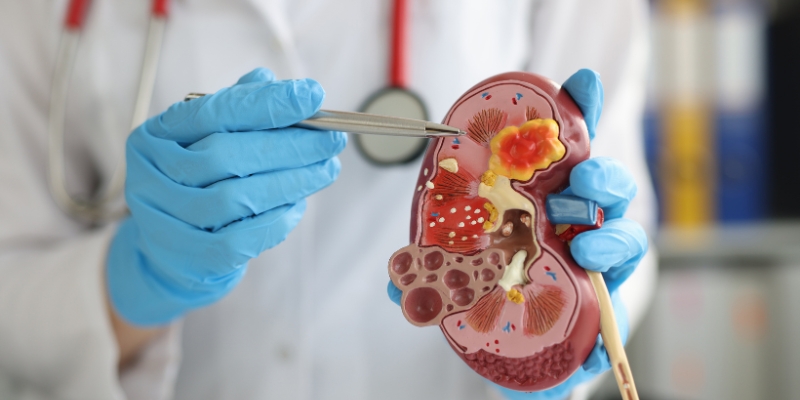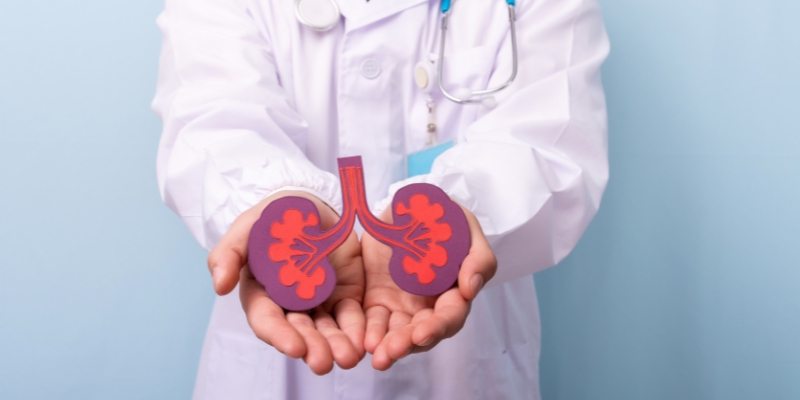Kidney disease is a global health crisis impacting millions. The kidneys, the body's natural filtration mechanism, are vital to health. This thorough essay will cover kidney disease's forms, causes, symptoms, diagnostic procedures, treatment choices, prevention measures, and its devastating influence on an individual's quality of life.

Understanding the Kidneys:
The kidneys on each side of the spine below the ribcage perform several critical tasks. They regulate blood pressure, electrolyte balance, and red blood cell synthesis and filter waste and excess fluids. The heart of kidney function is the millions of nephrons that filter blood and store electrolytes and water. The body's chemical balance and health depend on this complex filtering mechanism.
Types of Kidney Disease:
Kidney illness covers several disorders that impact these critical organs. Popular varieties include:
- Chronic Kidney Disease (CKD): CKD causes steady kidney function decline over time. It commonly develops over the years and is connected to diabetes and hypertension.
- Acute renal Injury (AKI): AKI causes fast renal function loss. It may be caused by injuries, severe illnesses, or drug responses.
- Polycystic Kidney Disease (PKD): This hereditary condition causes several kidney cysts. Over time, these cysts might develop and impede kidney function.
- Other kidney illnesses include kidney stones, glomerulonephritis, and nephrotic syndrome, each with its causes and symptoms.
Causes and Risk Factors:
Kidney disease can result from a multitude of causes, including:
- Diabetes: Chronically high blood sugar damages renal filtration units, causing CKD.
- Hypertension: Uncontrolled high blood pressure strains renal blood vessels, reducing kidney function.
- Genetics: Kidney illnesses like PKD may be inherited.
- Infections: Sepsis and other severe infections may cause AKI, a fast loss in kidney function.
- Some drugs might damage the kidneys if not taken correctly or under medical care.
- Kidney disease management requires identifying and treating risk factors such as family history, obesity, smoking, and specific medical disorders.
Symptoms and signs
Kidney disease symptoms vary by kind and stage. Early kidney illness may go unnoticed. As kidney function diminishes, weariness, edema, urine frequency and color changes, difficulties focusing, and high blood pressure may occur. In severe phases, nausea, vomiting, muscular cramps, itching, and more might occur. Untreated kidney illness may cause heart disease, anemia, bone disease, and nerve damage. Early detection is critical to managing and treating these symptoms.
Diagnosis and Screening:
Medical history, physical exams, and various diagnostic procedures are needed to diagnose renal disease. Serum creatinine and GFR assays help evaluate kidney function. Urinalysis reveals urine composition anomalies, revealing kidney health. Imaging investigations like ultrasounds and CT scans provide comprehensive kidney pictures that aid diagnosis.
People at risk of renal disease need frequent kidney function tests. Early identification allows prompt intervention, improving results and quality of life.

Treatment and Management:
Kidney disease therapy depends on the kind and stage. Dietary changes, salt reduction, and weight control are commonly needed to treat renal disease. Blood pressure, blood sugar, and renal disease problems may be treated with medications.
Dialysis or kidney transplantation may be needed in extreme instances of renal failure. Dialysis temporarily replaces kidney function by filtering blood waste and excess fluids. Alternatively, transplantation replaces a damaged kidney with a healthy one from a live or dead donor. Kidney disease treatment requires ongoing monitoring and management to avoid worsening and optimize health.
Prevention and Lifestyle:
A healthy lifestyle may considerably minimize kidney disease risk, even if certain risk factors are uncontrollable. Maintaining hydration, eating a balanced diet, limiting alcohol, stopping smoking, and controlling diabetes and hypertension are ways to improve kidney health. Weight control and exercise are also essential kidney disease preventive strategies.
Impact on Life Quality:
Kidney illness, especially severe stages, may significantly influence quality of life. Managing physical and emotional issues is difficult. Seeking medical aid, spending time with family, and joining support groups may help people cope with the sickness. Management of renal illness must include emotional awareness and treatment.
Research and Advancements:
Kidney disease research constantly increases diagnostic accuracy, treatment choices, and patient outcomes. Kidney disease treatment may benefit from regenerative medicines and less invasive methods. These advancements may lead to more effective and individualized therapies in the future, so healthcare practitioners and patients must stay informed.
Kidney Disease Stages:
Each kidney disease stage has its own features and patient care consequences. GFR, a renal function indicator, classifies kidney disease stages. Stages 1 and 2 may be overlooked due to minor symptoms. However, Stage 3 symptoms worsen as renal function falls. End-stage renal disease (ESRD) requires dialysis or transplantation since the kidneys have lost most of their function by Stage 5. Understanding these phases helps healthcare practitioners customize treatment programs, and people understand their condition and make educated healthcare choices.
Complications of kidney disease:
Kidney illness may cause a chain of health issues. Heart disease and high blood pressure, which affect kidney function, are typical consequences. Low erythropoietin production in damaged kidneys causes anemia, another common issue. Phosphorus and calcium abnormalities typically cause bone disease, which weakens bones and increases fracture risk. Nerve injury, often peripheral neuropathy, causes pain, numbness, and muscular weakness. Recognizing these problems is crucial since their therapy is part of renal disease patients' overall care plan to protect kidney function and quality of life.
Pediatric Kidney Disease:
Children with renal illness have particular problems. Congenital obstructive uropathy and acquired nephrotic syndrome are examples. Kidney illness in children may stunt growth, so early diagnosis and treatment are crucial. Medication, diet changes, and dialysis or transplantation may be used. Pediatric nephrologists provide specialized treatment and assistance to children with kidney disorders.
Elderly and Kidney Health:
Renal function weakens with age, rendering older people more prone to renal problems. Age-related renal alterations may impact drug metabolism and worsen medication-related kidney injury. Older adults commonly have hypertension and diabetes, which increase kidney disease risk. Seniors with renal disease need regular monitoring, medication management, and attention to diet and hydration. Maintaining senior health and quality of life requires proper renal care.
Conclusion:
Last but not least, kidney disease is a complicated and sometimes dangerous ailment that requires vigilant healthcare treatment. Understanding its origins, detecting symptoms, and adopting a kidney-healthy lifestyle will help preserve these critical organs. Early diagnosis, treatment, and care improve kidney disease prognosis and quality of life.




